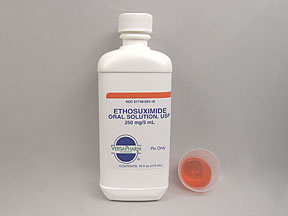
Zarontin Coupons & Savings Card – Discount Prices from $37.79
Brand for: Ethosuximide
My prescription
Edit
473ML of 250MG/5ML, Ethosuximide (1 Bottle)
Select pharmacy

CVS
$37.79
COUPON PRICE
Walmart
$40.92
COUPON PRICE
Walgreens
$50.62
COUPON PRICE
Albertsons
$60.13
COUPON PRICEZarontin savings card
Show this card to your pharmacist
CVS
$37.79
BIN
ID
PCN
GRP
019876
LH5D48EFB7
CHIPPO
LHX
Powered by
Related anti-epileptics prescriptions
More prescriptions for epilepsy
Related anti-epileptics prescriptions
More prescriptions for epilepsy
Price history for Zarontin (brand) & Ethosuximide (generic)
1 Bottle, 473ML of 250MG/5ML
Average retail price for Zarontin
Average retail price for Ethosuximide
Average SaveHealth price for Ethosuximide
Our price history data is based on aggregated prescription data collected from participating pharmacies in America. Our prescription data updates daily to reflect the latest price changes. If you notice a missing data point, it means there wasn't sufficient data available to generate a monetary value for that date.
Over the last 12 months, the average discount price of Zarontin is $115.90 using the SaveHealth savings card. That's an average savings of 48.84% on Zarontin with our discount card.
*Retail prices are based on pharmacy claims data, and may not be accurate when we don't have enough claims.
Zarontin (Ethosuximide) dosage forms
Dosage Quantity Price from Per unit 473ML of 250MG/5ML 1 Bottle $37.79 $37.79 473ML of 250MG/5ML 2 Bottles $65.28 $32.64 473ML of 250MG/5ML 3 Bottles $84.76 $28.25
| Dosage | Quantity | Price from | Per unit |
|---|---|---|---|
| 473ML of 250MG/5ML | 1 Bottle | $37.79 | $37.79 |
| 473ML of 250MG/5ML | 2 Bottles | $65.28 | $32.64 |
| 473ML of 250MG/5ML | 3 Bottles | $84.76 | $28.25 |
What is Zarontin used for?
Zarontin is used to treat absence seizures, which are a type of seizure characterized by brief, sudden lapses in attention.
Is Zarontin being discontinued?
As of the latest available information, Zarontin (ethosuximide) has not been officially discontinued. However, availability can vary based on location and manufacturer supply issues. It is advisable for individuals to check with their healthcare provider or pharmacist for the most current information regarding the availability of Zarontin.
What is the generic for Zarontin?
The generic name for Zarontin is ethosuximide.
Does ethosuximide cause behavior problems?
Ethosuximide can cause behavior changes in some individuals. These may include mood swings, irritability, or hyperactivity. It is important for patients taking ethosuximide to be monitored for any changes in behavior, and any concerns should be discussed with a healthcare provider.
What type of seizures can be treated with Zarontin ethosuximide?
Zarontin (ethosuximide) is primarily used to treat absence seizures, which are a type of generalized seizure.
